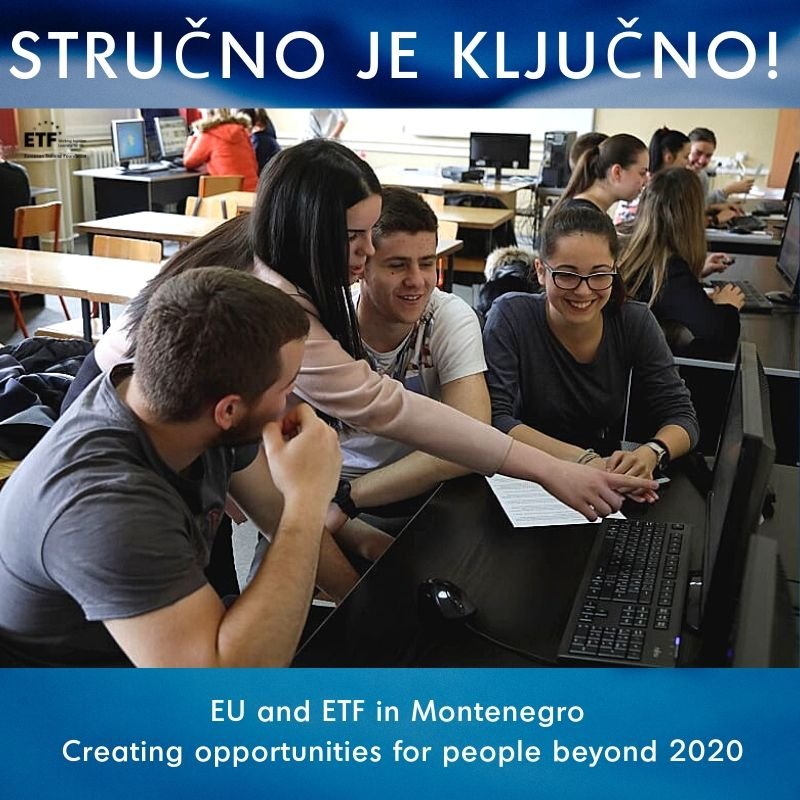
Montenegro: Teacher training in the spotlight
Vocational schools in Montenegro are building a network of in-service training coordinators to improve the continuous professional development of teachers.
Vocational schools in Montenegro are building a network of in-service training coordinators to improve the continuous professional development of teachers. A two-day conference in Podgorica, supported by the ETF, showcased advances made since the introduction of a licensed teachers law of 2014.
Motivation for professionalism
Montenegro, with a population of 615,000, has probably the smallest network of national vocational schools in Europe - around 40. But the enthusiasm of vocational teachers for improving their professional qualifications and approaches reflects a country punching well above its weight in continuous professional development (CPD).
A new initiative to create a network of school-based CPD coordinators in the country brought together around three-quarters of representatives from Montenegro's vocational schools on Monday (May 27) for two days of workshops and brainstorming.
Introducing the workshop, Svetlana Čabarkapa a senior advisor at the Ministry of Education, emphasised the importance of the adoption five years ago of the licensed teacher law.
Licensed to train
"Continuous professional training is designed to support teachers throughout their career," Ms. Čabarkapa said.
"The licensed teacher law of 2014 grants licences valid for five years - during which time a certain number of training courses must be undertaken."
The role of school-based CPD could not be underestimated, she added.
"The new age requires new forms of teacher training - and the ministry has designed, and the government approved, a new strategy for teacher training through to 2024."
European priorities
Ulrike Damyanovic, the ETF's country manager for Montenegro and regional expert, said that the renewed focus on training came at an opportune moment.
"Montenegro's new vocational training strategy is being designed as a new wave of European Union programmes is coming up," she noted.
"The post-2020 strategy is looking at this very area; for example the ETF has already done pilots where teachers take part in company exchanges to improve vocational training. It is very important to continue to have a dialogue with the world of work."
Upgrading teacher skills also needed to take note of the needs of the wider population beyond younger students into account, she added.
"We also have an ageing population - they need skills and lifelong learning in the workplace. Here the teacher is also important."
Going back to basics
Marko Vukašinović, head of department for international cooperation and European integration at the Ministry of Education, told participants that grassroots coordination and activity was at the core of reforms in vocational training delivery.
"This event matches perfectly well all the things we have also identified as international priorities," he said.
"We can produce as many laws and strategies as we like - but it is worth noting that if these are not fully implemented in the classroom and bear fruit there, then nothing works."
Coming together to discuss professional training was an "important opportunity for you to take leadership and come together to find optimum solutions," he added.
Motivation and mentorship
Participants in the workshop emphasised the importance of motivation and the rewards that came from mentoring trainee teachers and opportunities offered by exchange programmes for CPD.
CPD offered "a stronger feeling of belonging to a school" and improved goal-orientation, teacher and CPD coordinator Aleksandra Lalevic, said, adding: "Career advancement is among the best motivations to encourage teachers to engage in CPD."
Agents for change
Julian Stanley, the ETF's expert on CPD, told the conference: "It is really important for teachers to have an opportunity to progress. To learn new skills, take on new responsibilities and show what they can do. This is something which should be supported as this is how improvements in teaching come about."
He added that by developing a network and "bringing together teachers that know their schools and who are ambitious and want a chance to shape their professional, they can become leaders in Montenegro." Such an approach could also help international donors and the Ministry of Education to better manage scarce resources, targeting them where most needed.
Did you like this article? If you would like to be notified when new content like this is published, subscribe to receive our email alerts.